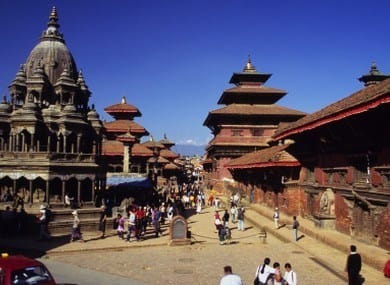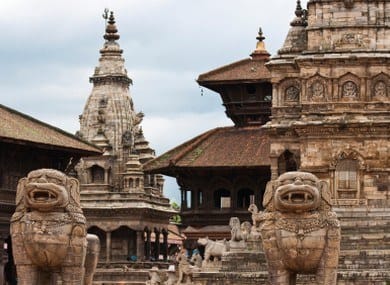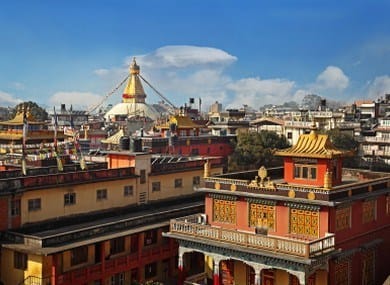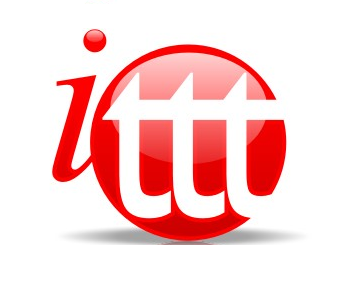We offer a world-renowned TEFL / TESOL certification course in Nepal that equips you for the professional task of teaching English overseas, or in your home country. Our TEFL certification courses last for four weeks and have a very practical emphasis. There is no need to speak any language other than English, as our courses concentrate on training you to teach English with the international standard communicative approach – where English is the only language used in the classroom.
This is the most practical and fundamental area of any TEFL training course. During the teaching practice sessions, trainees have the opportunity to teach real students of English and put into practice the skills learnt during the theoretical parts of the course.
2) Foreign Language Experience
During the course, trainees receive instruction in an unknown foreign language to help them reflect on the experience of being a learner. This session is extremely useful in creating empathy between the teacher and student and should help trainees to direct their own teaching.
3) Language Awareness
a) This area focuses on grammar and covers subjects such as parts of speech, the structure of tenses, conditionals and modals and other common grammar points. During these sessions trainees learn about these subjects as well as ways to teach them to their future students in the classroom.
b) This area also looks at the subject of phonology and covers phonemics, word and sentence stress, intonation and connected speech.
4) Student Profile
For this part of the course, each trainee is required to work with an individual student in order to work on things such as rapport building, error analysis, correction techniques and addressing individual student needs. Three meetings with the student are required to complete the profile, after which the trainee completes a one-to-one lesson with their student. The final stage is the completion of a written report regarding the lesson.
5) Teaching Techniques
This component of the course covers areas such as:
- Lesson planning
- Classroom management
- Establishing rapport
- Discipline in the classroom
- Managing equipment and teaching aids
- Creating materials
- Correction techniques
- Evaluation and testing
- Teaching vocabulary
- Teaching grammar
- Teaching receptive skills (reading and listening)
- Teaching productive skills (speaking and writing)
- Games in the classroom
- Songs in the classroom
- Teaching beginner students
- Teaching individual students
6) Materials Project
All trainees are required to create their own set of materials to be used during the teaching practice. These materials will be useful in future teaching environments and will help to instill the benefits of creativity and resourcefulness in relation to your lesson planning. The materials should be easily portable, durable and adaptable for different lesson points.
Once you have created your materials project you will present it to a course trainer and demonstrate how it will be used in the classroom. Your trainer will then provide advice and suggestions on how they can be improved and how they could be used in another context.
Apply Today
All applications from candidates aged 18 (younger ages may be considered in exceptional circumstances) and above will be considered for our English teaching courses. Our in-class TEFL courses are intensive, four-week programs; however, all trainees should still have sufficient time to explore the local area, experience the culture and to meet new people. Also, individual course organizers will often arrange leisure activities for our trainees so they can socialize in their spare time and make the most of their experience.
Getting Started
The first step in enrolling on our TEFL course in Nepal is to complete a free application. If you are at least 18 years of age and speak English fluently, you are eligible to apply for the course. The application is brief and we will send you a prompt reply. Once approved, you will receive additional information about the course content and schedule, your accommodation options, travel arrangements, as well as payment options and more.
Apply today and you will be on your way to starting a TEFL course in a city where the local culture is every bit as majestic as the nearby mountains. However, training in Kathmandu doesn’t mean you have to stay in Nepal. If you would like to move on after the course we can help you find a job nearly anywhere in the world.
Course fees
The total price is divided into: deposit and balance.
The deposit may be paid via a) credit card b) PayPal c) wire transfer d) Western Union.
The balance of the course fee must be paid by cash, PayPal or bank transfer directly to the training center on the first day of the course.
Reviews
TEFL Kathmandu | TEFL Nepal
Nepal is a magical place and taking a TEFL course here will see you studying right in the heart of Kathmandu, Nepal’s most dynamic and sophisticated city. Upon completion of the course, we will help you find a job and you will be well on your way to beginning a wonderful new career teaching EFL.
The birthplace of the Buddha, Nepal is nestled among the awe inspiring peaks and foothills of the Himalayas. Its scenery is simply astonishing and offers some of the best hiking opportunities to be found anywhere in the world. Although Nepal is not a wealthy country monetarily, its friendly and welcoming people, its diverse and interesting religions, its cultural history and traditions, as well as its astounding scenery make it a very rich country indeed.
Suburban Kathmandu spills out primarily east of Kantipath, the principle north-south conduit that runs through the city, and is identifiable by two main landmarks: the Royal Palace and the Tundikhel parade ground. The majority of the more up-market hotels, restaurants and shops are grouped together along Durbar Marg, the wide thoroughfare that extends south from the palace gate. To the west of the Bishnumati River you will find the important religious complex of Swayambhunath perched on a hilltop overlooking the city. Also known as the Monkey Temple, this area is well worth a visit and is accessible by foot.
From the mesmerising Himalayan peaks to the verdant national parks, the myriad of pagodas and temples, the teeming markets, street vendors and the bars and clubs of Kathmandu, Nepal really does offer something for everyone.
TEFL Course in Kathmandu
Our TEFL Course in Nepal is delivered in a well respected language school in central Kathmandu. The school has been in business since 2008 and has extensive experience teaching English as a second language.
For accommodation during your TEFL course in Kathmandu, we have a good working relationship with several hotels within the city that we are happy to recommend and book for you. We personally inspect and monitor them all for cleanliness and standard of service. We recommend that you book early to ensure a better choice of options.
The course fees listed on our website are inclusive of course-related lessons, materials, teaching practice, assessments, certificates, references, lifetime job assistance and more. We have no hidden costs or extra charges so the prices you see on the site are the prices you will pay.
The School
Our TEFL course in Nepal is based in a language school situated in the very heart of Kathmandu. The school has been operating here since 2008 and has since gained an excellent reputation as a quality centre for the teaching of English as a foreign language.
The school has a small canteen on the premises that sells hot and cold drinks, and providing the weather is fine, you can relax in the schools garden during lunchtimes and other breaks in your study and teaching schedule. Close to the school you will find a variety of local shops selling snacks and other items, as well as several restaurants serving both local and international dishes.
Accommodation
For accommodation during your TEFL course in Kathmandu we are happy to offer a variety of options that should suit all budgets and personal preferences. We have developed a good working relationship with several hotels in the area that we have personally inspected and continue to monitor to ensure they provide a good level of cleanliness and service.
Our basic hotel options start at around US$ 407 per month for a single, fan cooled room. With this option you will have the choice of either single, double or twin beds, plus basic furniture such as a desk and wardrobe, as well as a private bathroom with hot water. Some rooms in this range will also include a television.
Our standard hotel options start at around US$ 559 per month and come with similar room amenities as above, however, within this range you can expect more services offered by the hotel and a higher overall standard.
All our recommended hotel options will provide room service, laundry and regular room cleaning services, an onsite restaurant and a minimum of a garden, balcony or roof terrace to relax in. Some hotels will also have internet access and/or Wi-Fi. All hotels are conveniently located within a 15 to 30 minute walk of the TEFL school.
Our course administrator will provide further details of our hotel options once you have confirmed your place on a course. You are also free to make your own accommodation arrangements if you prefer, however, we do recommend that you book as early as possible to ensure you have the widest choice available.
Accommodation Fees
The accommodation fees are $407 and up and are not part of the course price, you are free to choose whichever accommodation option you prefer.
You are not obliged to use the accommodation provided by the school and you are welcome to make your own accommodation arrangements. If you choose to use our accommodation, it should be paid for either by cash, PayPal or bank transfer directly to the school at the start of the course.
Reviews
FAQs
What are my payment options?
Course deposits must be paid to our administrative center. Credit/debit card payments are the fastest and cheapest way to pay, but we also accept payments via Western Union, Pay Pal and bank transfer. While there are no deadlines for a deposit, courses can fill up quickly and your seat will only be reserved after the deposit has been paid.
Once you make your deposit, you will receive an email with an informational packet that provides detailed information about the course and Kathmandu itself.
The balance of the course fees must be paid in cash in USD or Nepali currency in Kathmandu. All payments must be received by the end of lunch on the first day of the course.
Fees are all-inclusive so you won’t be asked to pay additional costs for course related materials or services. This also includes course moderation and accreditation fees, airport pick-ups* and lifetime job assistance.
* All the hotels we use for your accommodation provide free airport pick-up services. You will therefore be met by a driver at the airport and be taken directly to your hotel.
What are my accommodation options?
We can book accommodation for you in our preferred hotels in Kathmandu. You are, of course, more than welcome to make your own accommodation arrangements. After you have secured your place on the course we will provide full accommodation details and ask you to fill in an accommodation preference form. All payments are made directly to the hotel by cash or credit card either on arrival or on departure.
We can offer you a range of prices according to the standard of hotel and the type of room you would like to book. Prices for a basic hotel start at US$ 407 per month (for a single, non-AC room). Prices for a standard hotel start at US$ 559 per month (for a single, non-AC room).
Typically, a room in either a basic or standard option hotel will have single, double or twin beds, a wardrobe, a small desk and a private bathroom with shower. Some rooms may have a TV. All rooms have hot water. The difference between the basic and standard options is predominantly the facilities the hotel offers and the general standard of the hotel; although we are happy with the cleanliness and standard of all hotels we accommodate you in.
What travel documents will I need for Nepal?
At the time of writing, all visitors to Nepal (excluding Indian nationals), require a visa. Tourist visas can be obtained on arrival at the airport for every nationality other than Chinese, or at most overland borders. Please note your passport should have at least six months validity remaining on arrival in Nepal.*
* As this information is subject to change at any time, we advise you to contact your local consulate for current travel regulations prior to planning your trip. For more information on obtaining visas please check with your local Nepalese consulate or embassy.
What is the course schedule?
We hold an orientation session at 9:00 a.m. on the first day of the course. We recommend that you arrive in Kathmandu at least one day before in order to familiarize yourself with your surroundings and at least un-pack your bags before orientation.
Class-time is generally from 9:00 a.m. to 4:00 p.m. five days a week (Monday to Friday) with breaks in between classes. A typical day in the classroom consists of four 1.5 hour ‘inputs’. Approximately six-eight days will be spent preparing and undertaking your teaching practice sessions. Course timetables will be distributed during the first input session on the first day of the course.
What can I expect during teaching practice?
Your teaching practice will be conducted in a range of local governmental and private, primary and secondary schools and in some instances we may be teaching at orphanages, colleges and other institutions.
Lessons are based upon real teaching resources found all over the world and you will have the chance to create your own materials as well. You will receive the aid of your course trainer throughout lesson planning and receive immediate feedback on your lesson after it’s been delivered. Practicum is assessed and a satisfactory assessment is required to earn your TEFL/TESOL certificate.
Who usually attends the course?
We average eight trainees on each course. The majority of trainees are British or American, while many others come from Australia, New Zealand, Canada, Ireland, South Africa and the Philippines. Occasionally, we do get fluent non-native English speakers from Western Europe, Scandinavia, India, China, Thailand, etc. Trainees must be 18 years of age or older and the age range varies greatly depending on the course.
Is there a dress code?
There are no specific dress requirements for the input sessions held at the training centre. We do, however, ask you to be respectful of the country that you are in and ask you to dress in a modest fashion (no miniskirts, short shorts, low-cut tops etc.).
During teaching practice there are specific requirements that adhere to the local dress code. All trainees are expected to dress professionally according to the following guidelines:
Women: Shoulders should be covered, blouses with sleeves are suggested. No low-cut necklines, very short skirts or bare midriffs. Open-toed shoes are acceptable, but not hiking or flip-flop sandals.
Men: Long pants, slacks or trousers are required, jeans are not acceptable. Short or long-sleeved shirts with a collar are necessary, although a tie is not required. Loafers or dress shoes are both fine, sandals are not acceptable. Long hair should always be tied back.
What should I bring for course studies?
Please be sure to arrive on the first day of the course with a notebook and a pen. We encourage you to bring a laptop as we have Wi-Fi at the training center. We will provide all course materials for you so there is no need to bring anything else for the course itself.






